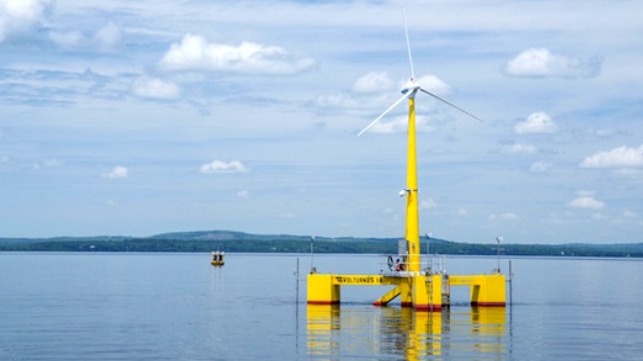
In an effort to launch the U.S.’s first floating offshore wind research site in federal waters, Maine has submitted an application to the federal Bureau of Ocean Energy Management (BOEM) that will begin a multi-year review process. The proposed lease for a 15.2-square-mile area nearly 30 miles offshore in the Gulf of Maine would be the next step in research ongoing for more than a decade at the University of Maine to develop floating concrete hull technology for offshore wind turbines.
Maine is proposing to deploy a small-scale research array of 12 or fewer wind turbines on innovative floating hulls designed at the University of Maine. This project will advance UMaine’s patented technology known as VolturnUS and will foster leading research into how floating offshore wind interacts with Maine’s marine environment, fishing industry, and shipping and navigation routes. Floating platforms are considered essential technology to develop deep-water offshore wind energy.
“This small-scale research array is a significant next step in the evolution of the University of Maine’s patented floating offshore wind technology and our commitment to Maine’s future,” said Joan Ferrini-Mundy, president of the University of Maine and the University of Maine at Machias, and vice chancellor for research and innovation for the University of Maine System. “VolturnUS represents the work of so many people at UMaine to develop a renewable energy and economic development solution focused on Maine’s unique needs and environment. They are contributing to the development of knowledge to advance offshore wind in Maine, the United States, and the world.”
Under the proposal to BOEM, the research area would be limited to 15.2 square miles, which is smaller than initial projections. This limited site is also 29 miles from the nearest mainland point of Cape Small, and 45 miles from Portland. It was selected following an extensive public outreach process, which included an analysis by the Maine Department of Marine Resources that helped identify areas that minimized known potential impacts on the fishing industry.
“This small-scale research site 30 miles off the coast will become home to innovative technology developed here in Maine,” said Governor Janet Mills. “The research project will help establish the best way for our state to embrace the vast economic and environmental benefits of offshore wind. Fundamentally, I believe that offshore wind and Maine’s fishing industry can not only coexist but can help us build a stronger economy and a brighter, more sustainable future for Maine people.”
The governor is expressing her strong support for the project saying it would address fundamental questions about how offshore wind can exist in the Gulf of Maine. In July, responding to protests from the fishing industry, the governor signed legislation prohibiting new offshore wind projects in state waters, which extend three miles from shore.
There is no specific timeline required for the application review by BOEM, which is a separate process from the state’s work to date, but it is expected to take several years before all permitting is secured and construction could begin.
SOURCE READ THE FULL ARTICLE
https://www.maritime-executive.com/article/maine-proposes-u-s-s-first-floating-wind-research-site